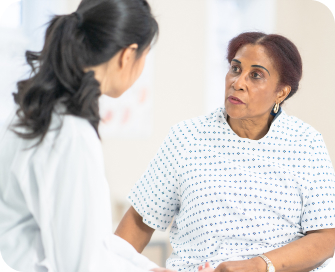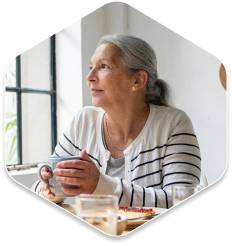
Tips for treatment
Understanding what to expect with your cancer treatment can feel overwhelming, but planning ahead may help you feel more prepared.
How to plan for treatment day
Learning about what to expect with your cancer infusion, surgery, or radiation treatment can feel scary, but planning ahead may help you feel more at ease on treatment day.
Some treatments, such as infusions or radiation, require travel to a health care setting. For those types of treatments, here are a few tips that may help you plan:
Ask your cancer care team how long your treatment may take
If you are planning around work, childcare, or transportation schedules, it’s important to know the total time your treatment may take. Consider travel to and from the treatment center, waiting time in the lobby, tests or conversations prior to treatment, the time for treatment itself, and any observation time after the treatment
Plan for a caregiver or friend to join you
Having someone join you on treatment day can offer many benefits. They can help provide transportation, offer moral and emotional support, and help you stay entertained during long waits. If you are unable to have someone come with you, let your care team know. They may be able to offer resources to help
Review notes from your care team
Your cancer care team may have shared information during your treatment education session, but you’re not expected to remember all of those details. It may be helpful to review your notes before treatment day. If you don’t have notes, don’t worry. Your cancer care team is there for any questions you may have
Bring a list of your current medicines
Prior to your appointments, it may be helpful to gather a list of your current medications. Your care team may ask you to confirm the medications you are taking and their doses. There are also medication trackers available online or in app stores
Making treatment day comfortable
Here are some tips that may help you feel more comfortable:
- Wear comfortable clothing. Your wait time before treatment might be longer than you expect and the waiting room or treatment room might feel cold. People often wear warmer clothes, like a sweater and thick socks. You can also bring a blanket to help you stay warm and comfortable
- Pack healthy snacks and water. Because some treatment sessions may take a couple of hours, it may be a good idea to bring water and a healthy snack. Your care team can help you choose the right snacks
- Bring books, music, or movies on your phone or tablet. These can keep you entertained while you wait. They can also help you feel calm if you’re feeling nervous before treatment

How do I cope after treatment?
Speak up about side effects and symptoms
During or after your treatment, you may experience side effects. These can vary as you go through treatment. Tell your care team how you’re feeling so they can help address side effects and symptoms early. You can also use a symptom tracker app to keep track of any changes to how you are feeling. To learn more, visit this page about managing cancer-related effects and keeping your care team informed.
Ask your care team what side effects you should expect during and after each treatment session.

Give yourself grace
You may be coping with a lot of feelings and changes right now. It’s important to remind yourself that this chapter might look a little different, and that’s OK. It can be helpful to remember why you started your treatment and that you have a support team behind you to help you reach your treatment goals.
How can I live well during treatment?
Learn how to get through treatment by tracking how you’re feeling, speaking up to get the support you need, and learning tips that can help you manage your symptoms and side effects at home.
You may also want to read…
US-KEY-08162 09/24




